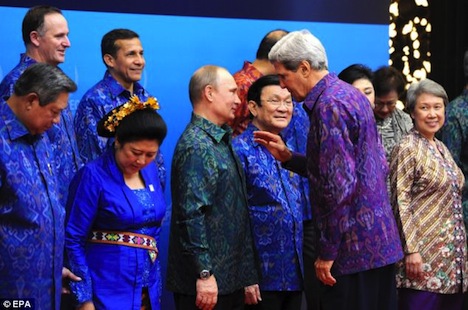The Asia-Pacific Economic Cooperation summit is going on this week half a world away — without the leader of the world’s largest economy, US president Barack Obama.![]()
![]()
![]()
But while Obama remains stuck in Washington waiting for a resolution to what’s become a joint crisis over the US federal government’s shutdown (entering its second week on Tuesday) and the showdown over raising the debt ceiling before October 17.
Obama’s absence from the APEC summit is about as stark an indictment as you can possibly imagine of the paralysis of the American political system. It serves the interests of no one in the United States — neither Obama nor Democrats nor Republicans (no matter how intransigent over health care reform) — for the US president to miss the summit.
John Kerry, the US secretary of state, flew to Bali in his absence where, alongside the other Asia-Pacific world leaders, Kerry donned a traditional Indonesian shirt (pictured above).
For Kerry, perhaps, he could pretend he’d finally made it to the White House — a dream that eluded him narrowly in his 2004 presidential bid.
But for the rest of the world, especially Chinese leader Xi Jinping and Russian president Vladimir Putin, it was another sign of the gradual breakdown of American hegemony.
As The New York Times reports, it leaves China as the dominant power at the summit at a time when the United States is hoping to prod negotiations for the Trans-Pacific Partnership and when the bilateral relationship with Indonesia, where Obama lived during his early youth, is undergoing transformation:
Mr. Obama’s absence was particularly damaging to American interests here in Indonesia, where the growing economy has been bolstered by a stronger Chinese presence that until a few years ago was resisted, said John Kurtz, the head of the Asia Pacific region for A. T. Kearney, a global management consulting firm. Mr. Xi visited Indonesia last week and announced that China would open a $50 billion infrastructure bank to service the region.
“Indonesia’s ethnic Chinese business giants have drawn closer to China and have benefited greatly with that,” said Mr. Kurtz, an American who lives in Jakarta. “They have begun to reshape the views of the government.” Indonesian businessmen feel “China’s effective economic support was unmatched by the United States,” Mr. Kurtz said. “There is a feeling that soft power loses to hard currency most of the time.” Indeed some prominent Indonesians had joked after Mr. Obama decided not to attend that the United States was “playing checkers while the Chinese play chess,” he said.
Moreover, as Elias Groll writes for Foreign Policy, China is happy to take advantage of the US political crisis to drink the United States’s milkshake:
Meanwhile, Chinese President Xi Jinping is seizing the moment to make the case for a rival trade bloc. The TPP, which so far does not include China, is viewed in Beijing as an effort to contain the country’s regional ambitions. As a result, Chinese diplomats are pushing their own trade group, a move lubricated by generous amounts of Chinese development spending.
Photo credit to EPA.
